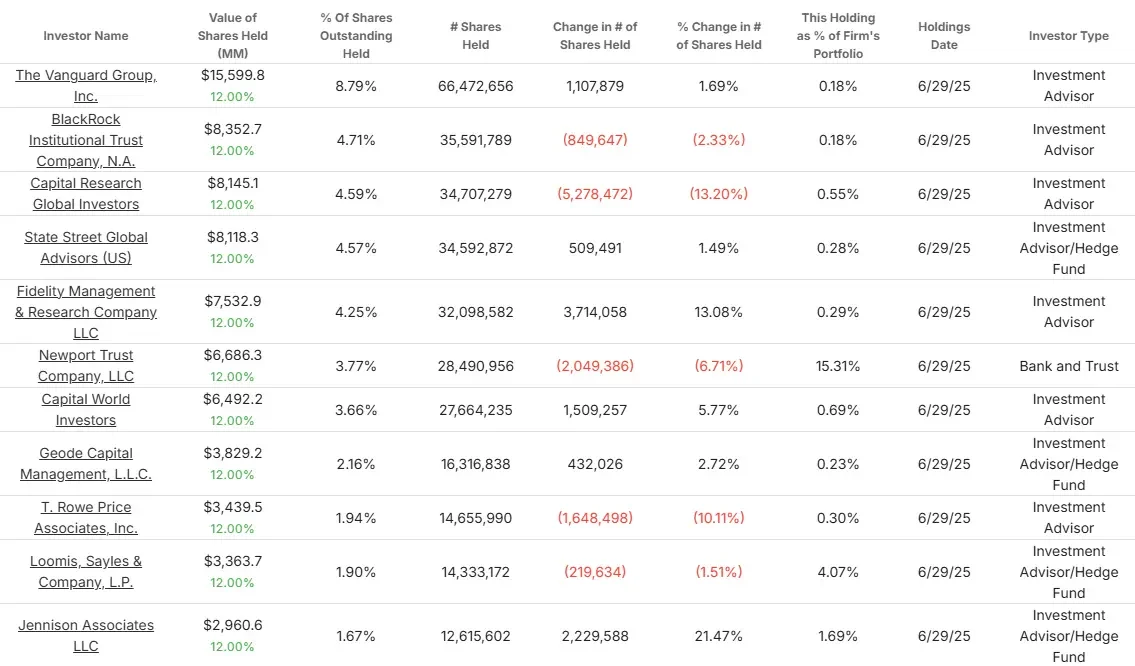The Boeing Company (NYSE: BA) is one of the world’s largest aerospace and defense companies, best known for designing and manufacturing commercial airplanes, defense systems, and space technology. Shares trade around $235, valuing the company at about $177 billion, up 36% in the past year as investors bet on a recovery in aviation and defense demand.
While Boeing has shown stock price strength, its fundamentals remain under pressure with slim margins, negative returns on invested capital, and high debt. That makes understanding who owns the stock and how insiders are trading it especially important for investors tracking confidence in the company’s turnaround.
Who Are Boeing’s Top Shareholders?

See whether Boeing’s top shareholders are buying or selling today >>>
Boeing’s shareholder base is dominated by the world’s largest index managers, with a mix of active funds adjusting exposure in opposite directions.
- Vanguard Group: 66.5M shares (8.8%), ~$15.6B. Added 1.1M (+1.7%).
- BlackRock: 35.6M shares (4.7%), ~$8.4B. Trimmed 850K (-2.3%).
- Capital Research Global Investors: 34.7M shares (4.6%), ~$8.1B. Cut 5.3M (-13.2%).
- State Street: 34.6M shares (4.6%), ~$8.1B. Added 509K (+1.5%).
- Fidelity: 32.1M shares (4.3%), ~$7.5B. Boosted 3.7M (+13.1%).
- Newport Trust: 28.5M shares (3.8%), ~$6.7B. Reduced 2.0M (-6.7%).
For investors, this mix suggests stability at the core thanks to passive giants like Vanguard and State Street, while the divergence between Fidelity’s heavy buying and Capital Research’s sharp selling shows that confidence in Boeing’s turnaround is still debated. Fidelity’s increase looks like stronger conviction in recovery, Capital Research’s cut may reflect caution on execution and debt, and Vanguard’s steady accumulation signals long-term index demand.
One highlight from last quarter is Squarepoint Ops LLC’s massive increase, boosting its Boeing stake by more than 3,200%. The fund now owns about 665K shares worth $139 million, a sharp jump that suggests a big swing in confidence.
Another eye-catching move came from DE Shaw, led by David Shaw, which lifted its Boeing position by nearly 2,900%. The firm now controls about 763K shares valued at $160 million, pointing to a much stronger tactical bet on the stock.
Meanwhile, Tang Capital Management, run by Kevin Tang, raised its holding by over 1,600%. The firm’s stake now stands at 106K shares worth $22 million, showing that even smaller funds are making aggressive moves into Boeing.
Track the top shareholders of over 50,000 global stocks (It’s free) >>>
Boeing’s Recent Insider Trades

Insider trades at Boeing can provide useful context on how leadership may be managing their exposure. These moves are often small and may be tied to diversification or planned selling, but they still give investors a sense of whether insiders are leaning into the stock or trimming back. Recent activity appears tilted toward selling, with only one modest purchase breaking the trend.
Here are some recent insider trades:
- Robert Ortberg (Officer & Director): Sold ~6,200 shares at ~$229.
- David Raymond (Officer): Sold ~6,600 shares at ~$230.
- Howard McKenzie (Officer): Sold ~2,500 shares at $234.
- Stephen Parker (Officer): Sold ~2,300 shares at $234.
- Mortimer Buckley (Director): Bought 2,200 shares at $226.
For investors, most of these transactions look like small sales that could be linked to diversification or planned activity. Buckley’s purchase was limited in size but stands out compared to the broader selling trend, which may be seen as a small signal of confidence.
See recent insider trade data for over 50,000 global stocks (It’s free) >>>
What the Ownership & Insider Trade Data Tell Us
Boeing’s ownership structure provides stability through passive giants like Vanguard and BlackRock, ensuring the stock remains a fixture in global portfolios. At the same time, active managers are split. Fidelity’s significant addition points to optimism about Boeing’s recovery, while Capital Research’s sharp cut shows that execution risks and leverage concerns are still top of mind.
On the insider side, most trades appear to be small sales, with just one director purchase on record. This doesn’t necessarily imply strong conviction from management at current prices, but it does suggest they may be cautious about adding more exposure for now.
For investors, the takeaway is mixed. Boeing continues to enjoy long-term support from index funds, but near-term sentiment from both institutions and insiders looks divided. Confidence in the aerospace recovery is evident, yet questions around debt, profitability, and consistent execution remain key factors shaping ownership trends.
Wall Street Analysts Are Bullish on These 5 Undervalued Compounders With Market-Beating Potential
TIKR just released a new free report on 5 compounders that appear undervalued, have beaten the market in the past, and could continue to outperform on a 1-5 year timeline based on analysts’ estimates.
Inside, you’ll get a breakdown of 5 high-quality businesses with:
- Strong revenue growth and durable competitive advantages
- Attractive valuations based on forward earnings and expected earnings growth
- Long-term upside potential backed by analyst forecasts and TIKR’s valuation models
These are the kinds of stocks that can deliver massive long-term returns, especially if you catch them while they’re still trading at a discount.
Whether you’re a long-term investor or just looking for great businesses trading below fair value, this report will help you zero in on high-upside opportunities.
Click here to sign up for TIKR and get our full report on 5 undervalued compounders completely free.

